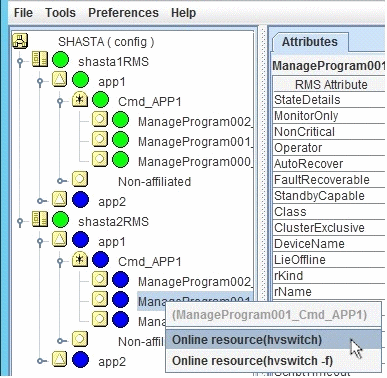When you switch a resource, RMS performs the following tasks:
If the userApplication that controls the resource is already started, RMS will stop it.
After the userApplication is completely stopped, RMS will start the resource on the specified node.
Switch the resource in the Online state according to the following procedure:
Right-click on the gResource object and select Online resource from the context menu.
Figure 7.24 Switching a resource

You will be prompted to confirm the action before RMS begins the operation. Starts all the resources which the specified resource depends on, and then starts the specified resource.
Figure 7.25 Confirming a resource switchover

If stopping the userApplication fails, RMS does not start the resource. This is because two competing instances of the same application could cause data corruption. In this event, you can start the resource by selecting Forced Resource Online.
Note
Use the Forced switch mode only if a resource cannot be switched normally. A forced resource switch overrides all safety checks and could therefore result in data corruption or other inconsistencies.
Therefore, to reduce the risk of data corruption when the Forced switch request of a resource is issued, the resource may be forcibly started after the node on which RMS is not running is forcibly stopped.
CLI: hvswitch resource
The syntax for the CLI is as follows:
hvswitch [-f] resource SysNode
The hvswitch command manually switches control of a userApplication or a gResource between SysNodes in the RMS configuration. When a type of the resource to be switched is gResource, the SysNode name of the node on which this command is executed should be specified. The -f option is a forced switch option.
Note
The resource can be switched only when the application to control the resource is Online, Offline, or Standby.